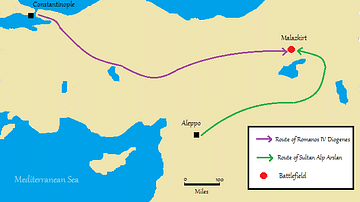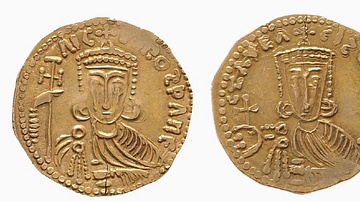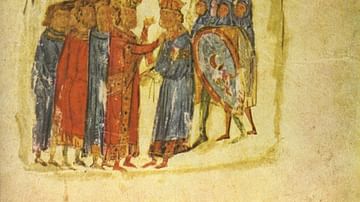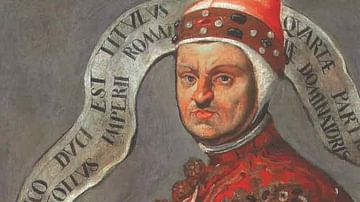Search Images
Browse Content (p. 1251)

Image
Romanos IV Histamenon
A gold Byzantine histamenon coin of the emperor Romanos IV Diogenes (r. 1068-1071 CE). (Classical Numismatic Group, Inc. http://www.cngcoins.com)

Image
Location Map of the Battle of Manzikert, 1071 CE
A map indicating the location of the Battle of Manzikert in August 1071 CE. The battle in Armenia was one of the greatest defeats suffered by the Byzantine Empire. The victorious Seljuk army led by the Sultan Alp Arslan famously captured...

Image
Battle of Manzikert
A painting depicting the aftermath of the Battle of Manzikert (Mantzikert) in August 1071 CE. The battle, in Armenia, was one of the greatest defeats suffered by the Byzantine Empire. The victorious Seljuk army captured the Byzantine emperor...

Image
Gold Coin of Nikephoros I
A gold nomisma coin of Byzantine emperor Nikephoros I (r. 802-811 CE). (British Museum, London)

Image
Nikephoros I Captured by Krum
A 14th century CE manuscript illustration depicting the capture of Byzantine emperor Nikephoros I (r. 802-811 CE) by the Bulgar Khan Krum in 811 CE.

Image
Khan Krum of the Bulgars
A 15th century CE manuscript illustration depicting the Bulgar Khan Krum (r. c. 802-814 CE) about to receive a drinking cup made from the skull of the Byzantine emperor Nikephoros I (r. 802-811 CE) whose army he had defeated in July 811 CE.

Image
Prometheus
Painting by Theodoor Rombouts (Antwerpen, 1597-1637 CE)
Oldmasters Museum, Brussels

Image
The Venetians Attack Constantinople, 1204 CE
A 16th century CE painting by Domenico Tintoretto depicting the Venetians attacking the sea walls of Constantinople in 1204 CE during the Fourth Crusade.

Image
Enrico Dandolo
A portrait by Tintoretto of Enrico Dandolo, Doge of the Republic of Venice (r. 1192-1205 CE) and prime instigator of the sack of Constantinople in 1204 CE during the Fourth Crusade.

Image
The Sack of Constantinople in 1204 CE
A 16th century CE painting by Palma Le Jeune depicting the attack on Constantinople in 1204 CE during the Fourth Crusade.